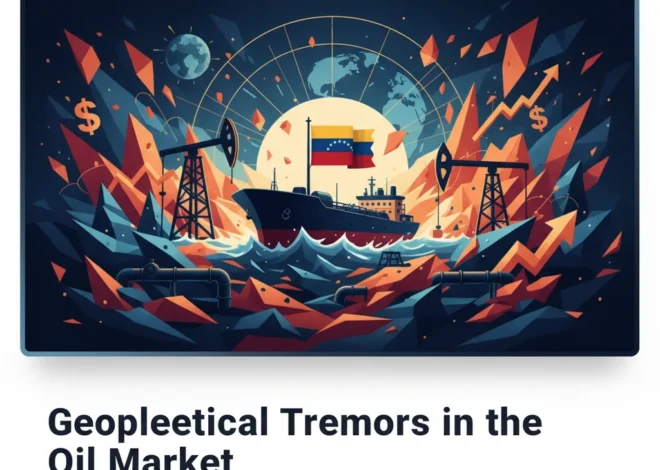
Geopolitics & Portfolios: Analyzing Trump’s Hungary Sanctions Exemption and its Market Impact
In a world where political headlines can move the stock market in an instant, a recent development from the White House has sent ripples through the global financial community. In a move that intertwines diplomatic relationships with economic statecraft, the US President has granted Hungary a significant exemption from a new wave of sanctions targeting Russian oil. This decision, reported to have followed a meeting between the US President and Hungarian Prime Minister Viktor Orbán, carves out a notable exception in the West’s unified economic pressure on Moscow over the ongoing conflict in Ukraine (source).
While on the surface this appears to be a purely political maneuver—a nod to a fellow right-wing populist leader—the implications for finance, investing, and the broader global economy are profound. For investors, business leaders, and finance professionals, understanding the undercurrents of this decision is not just an academic exercise; it is crucial for navigating the increasingly complex terrain of geopolitical risk and its direct impact on market dynamics, energy prices, and international trading relationships.
The Geopolitical Chessboard: More Than Just Oil
To fully grasp the magnitude of this exemption, one must first understand the context. Sanctions have become a primary tool of modern foreign policy, a way to exert pressure without direct military conflict. By targeting a nation’s core economic sectors—like Russia’s vast energy exports—the goal is to cripple its ability to fund its geopolitical ambitions. The latest round of US sanctions was designed to be the most punitive yet, aimed at compelling Russia to engage in a substantive peace process with Ukraine.
Hungary’s position in this geopolitical drama is unique. As a member of both the European Union and NATO, it is ostensibly aligned with the West. However, under Prime Minister Orbán, Budapest has often played the role of a contrarian, maintaining notably warmer ties with Moscow than its EU counterparts. This is not merely ideological; it is deeply rooted in economics. Hungary remains one of the European nations most heavily dependent on Russian energy imports to power its economy.
The table below illustrates Hungary’s significant reliance on Russian energy sources compared to other key EU economies, providing a clear economic rationale for its pursuit of an exemption.
| Country | Approx. Pre-Conflict Russian Oil Import Dependency | Approx. Pre-Conflict Russian Gas Import Dependency |
|---|---|---|
| Hungary | ~58% | ~85% |
| Germany | ~35% | ~55% |
| Poland | ~50% | ~45% |
| Italy | ~18% | ~40% |
Note: Figures are illustrative estimates based on pre-conflict data to show relative dependency.
This data highlights why forcing Hungary to completely decouple from Russian oil would have a disproportionately severe impact on its economy compared to its neighbors, who have had more success in diversifying their energy supplies. The White House’s decision to grant this relief can therefore be seen as a pragmatic acknowledgment of this economic reality, albeit one that raises difficult questions about the integrity and effectiveness of the overall sanctions regime (source).
The Economic Ripple Effect: From Budapest to Wall Street
A single exemption might seem minor in the grand scheme of the multi-trillion-dollar global economy, but its effects can be far-reaching. Financial markets abhor uncertainty and inconsistency, and this move introduces both.
Impact on Energy Markets and Trading
The most immediate impact is on the global energy markets. A key goal of oil sanctions is to reduce demand for the targeted nation’s supply, thereby lowering the global price they can command and slashing their revenue. An exemption, even for a smaller country like Hungary, creates a legitimate loophole. It ensures a continued flow of Russian oil into the EU, potentially creating opportunities for sanctions arbitrage—where oil could be purchased by the exempted party and subtly reintroduced into other markets. For commodity traders, this adds a new layer of complexity to oil price forecasting and risk management. It could put downward pressure on the “Urals” discount (the difference in price between Russian crude and Brent crude) and complicate the trading strategies of energy-focused hedge funds and investment banks.
Strains on Transatlantic and European Unity
For the wider investing community, the decision signals potential fractures in the Western alliance. A united front is critical for sanctions to have maximum impact. When one country receives a pass, it can breed resentment among others who are making significant economic sacrifices to uphold the policy. This can weaken the EU’s collective resolve and create political instability—a major red flag for those investing in European equities or the Euro. The long-term stability of the EU banking sector and economy relies heavily on this political cohesion.
Sanctions, Fintech, and the Future of Economic Warfare
This event also casts a spotlight on the evolving mechanisms of international finance and the tools used to enforce—and evade—economic sanctions. The global financial system has traditionally been the bedrock of sanctions enforcement. By controlling access to the US dollar and major clearing systems like SWIFT, Western powers have been able to effectively isolate rogue states from the global economy.
However, the landscape of financial technology is changing rapidly. The rise of fintech and decentralized finance (DeFi) presents both challenges and opportunities. On one hand, sophisticated new financial technology platforms can provide governments with more granular tools for monitoring and enforcing sanctions. On the other, the emergence of alternative payment rails and the use of blockchain technology and cryptocurrencies offer potential avenues for sanctioned entities to bypass traditional banking systems.
While there is no indication that these technologies are at play in the Hungary exemption, the broader trend is clear: the architecture of global finance is becoming more fragmented. Nations are actively exploring alternatives to the dollar-dominated system, and this geopolitical maneuvering only accelerates that exploration. According to the original report, the move to punish Russia was a direct result of the “lack of a peace deal with Ukraine,” a stark reminder that these economic tools are directly tied to battlefield outcomes. This tight coupling between military events and financial markets is a defining feature of modern economics.
Beyond the Basics: Four Pillars of Financial Mastery in the Modern Economy
This dynamic forces us to consider the long-term health of the current financial order. Every exemption, every political carve-out, and every successful circumvention of sanctions by a state actor slightly erodes the power of the economic tools the West relies on. This has profound implications for the future of international banking and the very structure of the global economy.
Conclusion: A New Paradigm for Investors and Leaders
The decision to exempt Hungary from Russian oil sanctions is far more than a footnote in a diplomatic communiqué. It is a critical data point for anyone involved in international finance, investing, or business strategy. It demonstrates:
- The Primacy of Geopolitical Risk: Political relationships and national interests are now direct inputs into financial models. The stock market is increasingly swayed by summit meetings, not just earnings reports.
– The Complexity of Energy Markets: The global flow of energy is subject to sudden political shifts, making energy trading and investment a high-stakes endeavor requiring deep geopolitical insight.
– The Fragility of Alliances: Seemingly unified economic blocs can have their cohesion tested, creating uncertainty that investors must price into their valuation of regional assets.
For the modern investor and business leader, the lesson is clear. A deep understanding of geopolitics, international economics, and the evolving world of financial technology is no longer optional. The lines between the situation room and the trading floor have been irrevocably blurred. Navigating the future of the global economy will require not only sharp financial acumen but also a keen appreciation for the complex, and often unpredictable, dance of global power politics.
Beyond the Bus Stop: Analyzing the Economic Fallout of the UK's Youth Transport Decision


